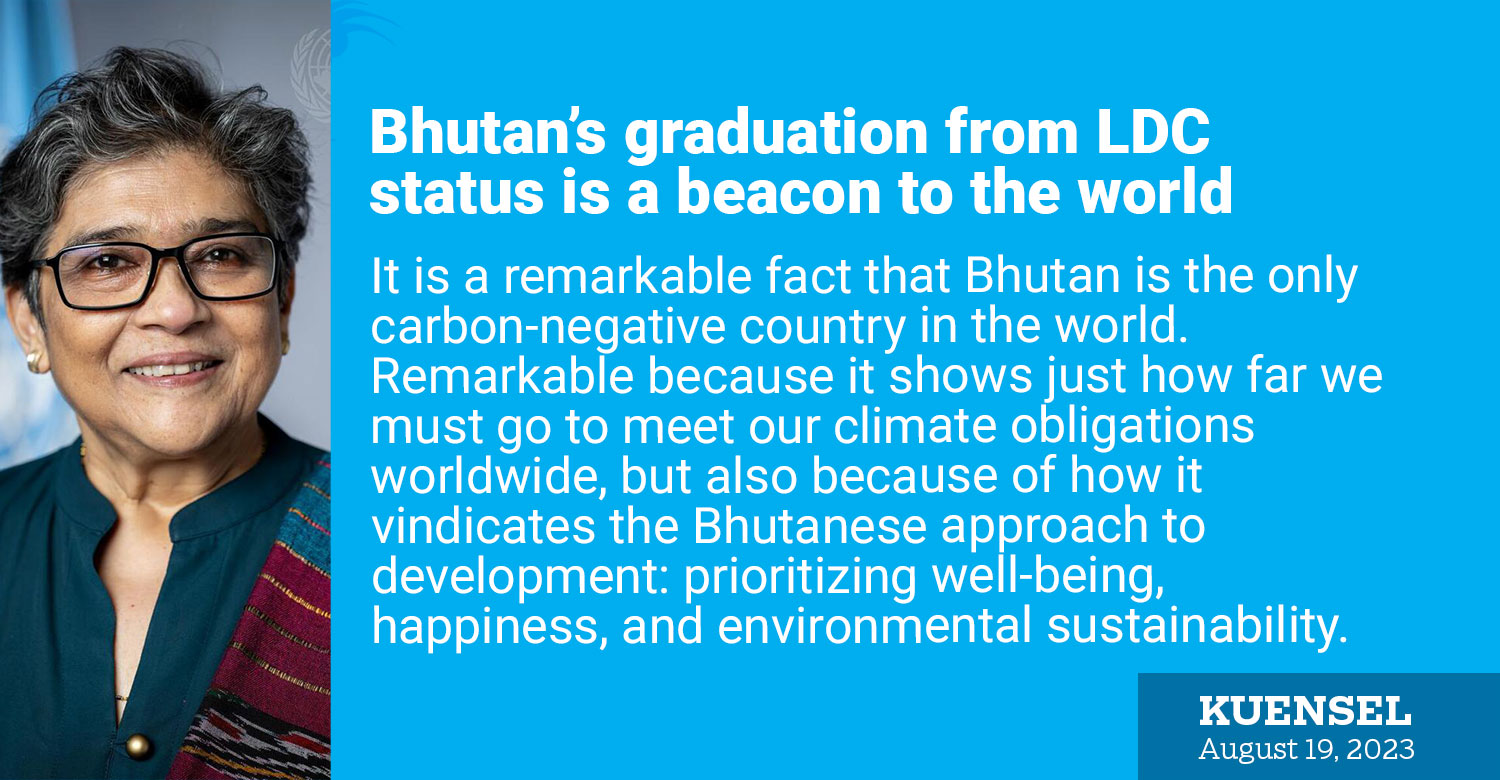… but there will be challenges to overcome
It is a remarkable fact that Bhutan is the only carbon-negative country in the world. Remarkable because it shows just how far we must go to meet our climate obligations worldwide, but also because of how it vindicates the Bhutanese approach to development: prioritizing well-being, happiness, and environmental sustainability.
Bhutan’s emphasis on ‘Gross National Happiness’ is not just a cause of global admiration; it manifests a deeply embedded philosophy that makes clear: progress without people’s wellbeing at its heart is a fool’s errand.
The national pursuit of growth through sustainable tourism, hydroelectric power, agriculture, and forestry encompasses an approach that is holistic, sustainable – and paying impressive dividends.
Bhutan’s economy has grown more than eight times since the year 2000 and so it is unsurprising that its official classification by the United Nations as a Least Developed Country (LDC) is about to come to an end.
In a process called graduation, Bhutan’s remarkable progress means that it will leave the ranks of the Least Developed and can integrate its economy more fully into the international system. The fact that only six other countries have ever graduated since the group was established in 1971 only adds to the scale of the achievement.
Graduation will be a major boost for Bhutan. Sources of financing are likely to diversify, giving more options for investments and for spending. It will convey a strong positive signal to the international market on Bhutan’s steady progress and reliability as a place to invest.
But while the fulfilment of the graduation thresholds is to be celebrated, it does not mean that all of Bhutan’s development challenges are over. It will continue to face many of its structural and environmental vulnerabilities – and it will take some time to adjust to the loss of some support measures that come with LDC status.
As the United Nations Conference on Trade and Development (UNCTAD) has noted in a recent publication, graduation from LDC category should be viewed “as the first milestone in a marathon of development rather than the winning post in a race to escape LDC status”.
The graduation challenges are indeed multifaceted – from tackling the shock of withdrawal of support measures, ensuring trade diversification and competitiveness, to maintaining steady socio-economic development.
Graduation should be viewed as a reward, not a punishment. And Bhutan will not be alone.
This is a shared endeavour. The international community must keep in mind that graduation is not only a success of the country itself but a testimony to the strength and effectiveness of global partnerships and multilateral cooperation led by the UN.
The global community must now rally around Bhutan in this crucial moment. Bhutan needs more official aid and concessional access to finance for development projects. Special treatment in issues of trade, improvements in the use of technology and skills building will help facilitate a seamless graduation and transition process.
Bhutan’s immediate challenge is a smooth transition from the category, which needs to build on Bhutan’s existing strengths and intensify economic diversification programmes with a view to building a robust and diversified economy.
In Doha earlier this year, world leaders gathered at the invitation of the United Nations Secretary-General to reaffirm their commitment to the Least Developed Countries and an ambitious new plan – called the Doha Programme of Action – that aims to get half of the 46 LDCs on the graduation track by the end of the decade.
With that commitment comes a new set of supports for countries just like Bhutan: in an increasingly challenging global context, to ensure that graduation should be sustainable and come as a reward, not a punishment.
One new and innovative facility, known as iGRAD, will offer six lines of service to graduating countries, all of which will be relevant to Bhutan. This will include access to climate financing and other financing instruments that would not automatically continue after graduation; peer learning and support to ensure that resource allocation aligns with national priorities and the Sustainable Development Goals; and support in accessing transitional finance to build further momentum, including investments in Science Technology and Innovation, education, and skills development.
Though the challenges are clear, Bhutan’s success provides an important lesson for the world – especially other LDCs and small landlocked developing countries. As a global leader in prioritizing the environment, sustainability, and the happiness of its citizens, the development trajectory followed by His Majesty’s government is a model for all.
This is a point we hope to drive home at next year’s United Nations Conference on Landlocked Developing Countries in Kigali, Rwanda, at which we hope that a newly graduated Bhutan will share its unique success and experience.
Bhutan’s graduation is truly a momentous occasion. It marks the start of a journey to develop, diversify and deliver true prosperity for its citizens. I am honoured and delighted to share this moment with all of you.
Contributed by
Rabab Fatima
She is United Nations High Representative for the Least Developed Countries, Landlocked Developing Countries and Small Island Developing States.


